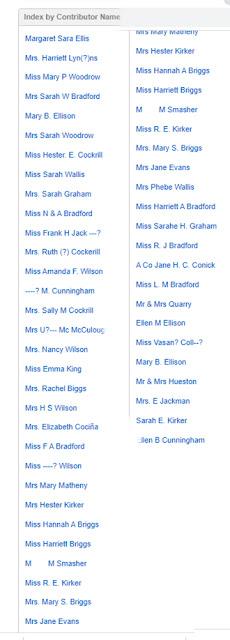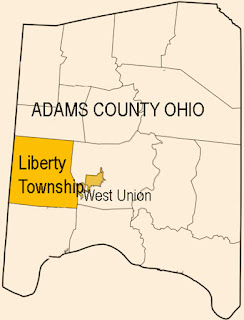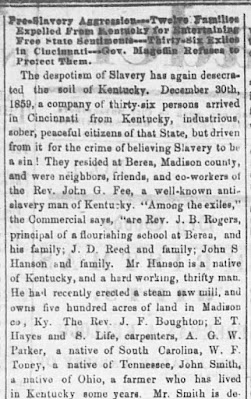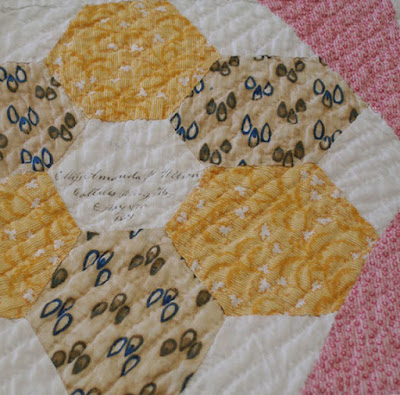"Teach all Nations Freedom" 1854
When Matilda Hamilton Fee moved to Kentucky in 1854 several women
from West Union, Ohio made an album quilt to present to her.
Presented to Mrs .Fee
of Kentucky.
by the Ladys of West Union Ohio
1854
The library has transcribed the names on the blocks
and one could go through the list and find the signers, for example...
Sarah Ellen Kirker (1846-1900), a child at the time the quilt was made.
Sallie was a member of an important family in Liberty
Township in West Union. Her grandfather Thomas Kirker was Ohio's
second governor.
Two other Kirkers's names are on the quilt.
West Union-ites before the fire of 1876 destroyed the old stone courthouse
It looks like the gift givers were residents of rural Liberty Township
rather than the county seat town of West Union with a population of about 500
in the 1850s.
More information on the names might
explain who was from the town of West Union
and who from Liberty Township west of town.
Matilda Hamilton Fee (1824-1895)
probably in her fifties.
The quilt went off to Kentucky, about 100 miles across the Ohio River with Matilda Hamilton Fee, whose husband John had taken up a challenge from Kentucky abolitionist politician Cassius M. Clay to found an anti-slavery church in a slave state.
Fee soon decided a college open to Black & white students was the next step and Berea College (a Biblical name) was opened in 1855.
neighbors threatened Berea throughout the last years of the 1850s until the Harpers Ferry insurrection ignited more hostile actions in December, 1859.
With her husband traveling elsewhere, Matilda rode north in a carriage with her four children. Her youngest boy 4-year-old Tappan Fee (undoubtedly named for a New York abolitionist family) died a few months later of diphtheria. Believing that a cold chill caused most diseases they blamed the trip and the Kentuckians for his death.
John Gregg Fee & Matilda in the 1860s
They married September 26, 1844.
The Fee's house in Berea.
The Fees, both Kentucky born, knew their chosen path would be difficult. Their slave-holdingneighbors threatened Berea throughout the last years of the 1850s until the Harpers Ferry insurrection ignited more hostile actions in December, 1859.
January, 1860 article from the proslavery Louisville Courier
announcing the expulsions of the Berea leaders.
The Fees and their co-educators sought refuge in Cincinnati
across the Ohio River.
The 1860 census taken in the summer shows them living in Storrs Township,
west of the city with their three remaining children.
They resided with the family of J.D. Reed, another minister.
Once the Civil War began Kentucky remained in the Union although the residents continued deeply divided in sympathies. Matilda ventured back to Berea in 1862 riding with with Laura and Burritt, 16 and 12, in a buggy and a wagon painted with a Union flag.
In his autobiography John recalled:
"The country at that time was full of soldiers, Union and Rebel....after securing a small supply of groceries for a destitute home in a destitute region...coming through Richmond, our county seat, the people, men and women, expressed surprise at seeing a woman driving along the highway. She had not proceeded more than three miles when she was halted by Union pickets, who at first suspected she might be a rebel spy, conveying news to Kirby Smith's men, who were already near to her home. Her frank manner...her story of who she was and where she was going, together with the Union flag painted on her carriage... all these considerations constrained the officer to say, 'Let her go; she is all right.' She came to her humble home, constructed a bedstead, filled a tick with straw, borrowed a blanket to sleep under, lay down with her two children and slept."
Morgan's Confederate raiders in Ohio
Rebel soldiers soon raided the house, taking:
"her borrowed blanket, her coarse and fine comb, her better shoes and Burritt's hat, and the carriage harness. The horse and carriage were hid in the woods. My daughter Laura had a very nice Union flag which her mother had made, and with this a set of silver spoons her grandfather had given to her; these she had hid up in the eaves-trough."
Finding Berea in a turmoil with "scenes of privation, anxiety and toil," Matilda gave up her home after ten weeks. "My wife's mother came, informing her where I was, and helped her and the children back to the border of the State." The women probably settled in Clermont County, Ohio just north of the Ohio River where son Ed Sumner Fee was born in March, 1863.
Camp Nelson, Jessamine County, Kentucky
John heard of Camp Nelson, home to a training center for United States Colored Troops. Typically considering his impulsive ideas as communication with the Deity, he decided they needed religious instruction. "Without counsel from, or commission from any board, I immediately prepared to go; took my eldest son, my dear Burritt...and on the next Saturday started for Camp Nelson, thirty-five miles distant."
He told the Quartermaster he wanted "a place for religious service and regular preaching," and was given it on the condition that he also teach the recruits to read and write.
University of Kentucky Special Collections Research Center.
Refugees living at Camp Nelson in 1864. Families often joined the soldiers there.
Matilda seems to have remained in Ohio but returned to Berea where daughter Bessie Hamilton Fee was born just as the war ended in April, 1865. After the war the Fees continued in leadership roles at Berea, Matilda in charge of the Ladies' Board of Care through the 1880s.
Students in the late 1880s
More information:
https://libraryguides.berea.edu/feequilt/home
https://www.berea.edu/president/blog/matilda-fee-and-elizabeth-rogers-heroines-of-the-berea-story/

























No comments:
Post a Comment